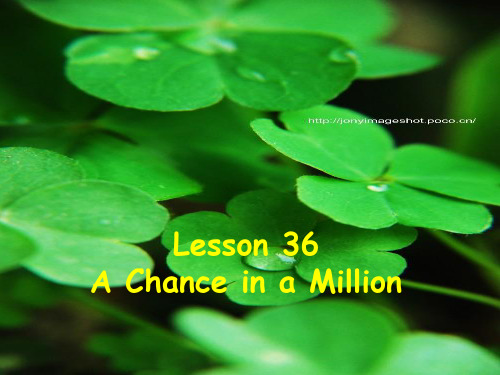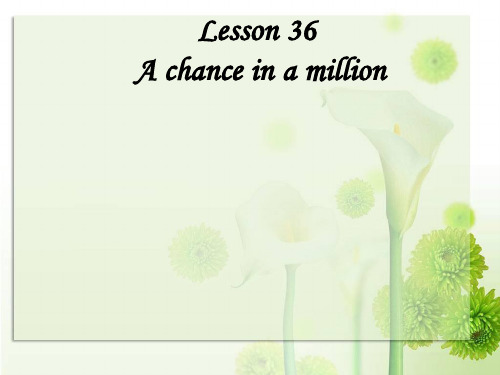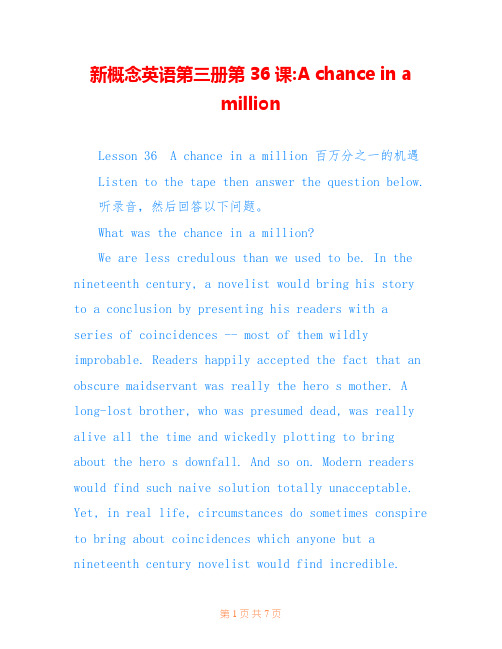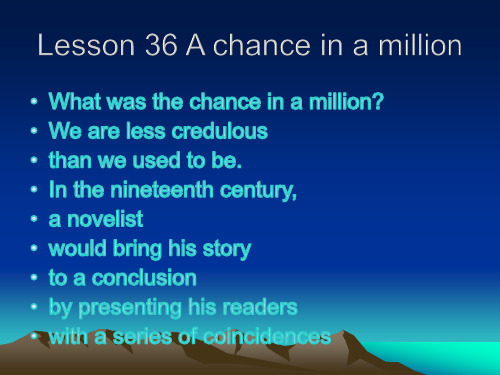新概念三Lesson36课件
新概念3Lesson36

a chance in a million one chance in a thousand 可能性小 在这儿见到你可真是不容易呀 It is a chance in a million to meet you here. He let out a scream that must can be heard in Peru. 典型的夸张,目的是加强语气
Yet, in real life, circumstances do sometimes conspire to bring about coincidences which anyone but a nineteenth century novelist would find incredible. 不过,在现实生活中,有时确实会出现一些 巧合,这些巧合除了19世纪小说家外谁也 不会相信。 do—加强语气,really
While on a walking tour with his wife, he stopped to talk to a workman.
一次,他与妻子徒步旅行。途中,停下来与 一个工人交谈。 he was on a walking tour………..省略了he
After they had gone on, Mrs Bussman commented on the workman's close resemblance to her husband and even suggested that he might be his brother. 接着他们继续往前走去。巴斯曼夫人说那工 人与她丈夫相貌很像,甚至猜测他可能就 是她丈夫的兄弟。 comment on sth 就...作出评论\评价--remark on eg:I can't explain how it is that he is still here.
新概念英语NCE3_lesson36(共42页)课件

• obscure adj. • 1)不起眼的,不出名的 • -The bus stopped at an obscure little town. • 2)模糊不清的 (not clearly ) • -An obscure figure can be seen through the
fog. • 同: • vague 多用于比喻意,指不明确说明而造成的模
糊不清
• -what he said is vague.
• credulous adj.轻信的 • -He is more credulous than me. • 【辨】credulous/credible/believable比较: • credulous (多修饰人) • credible 可信的,可靠的(多修饰事物 ) • -The story he told us is credible.
• naive adj.天真的,幼稚的 • naive person 幼稚的人 • naive remark 幼稚的话 • 同: • lovable 可爱的 • cute (尤指孩子)可爱的 • adorable 可爱的(口语常用)
• unacceptable adj.不能接受的 • be unacceptable to sb. • 对某人来说不能接受 • -他没法接受失败。 • -Failure is unacceptable to me. • 反:acceptable
• resemblance n.相似的(=likeness) • bear a strong resemblance to sb. or sth.
极其相似
• -The girl bears a strong resemblance to her sister.
新概念英语第三册第36课-A chance in a million

新概念英语第三册第36课:A chance in amillionLesson 36 A chance in a million 百万分之一的机遇Listen to the tape then answer the question below.听录音,然后回答以下问题。
What was the chance in a million?We are less credulous than we used to be. In the nineteenth century, a novelist would bring his story to a conclusion by presenting his readers with a series of coincidences -- most of them wildly improbable. Readers happily accepted the fact that an obscure maidservant was really the hero s mother. A long-lost brother, who was presumed dead, was really alive all the time and wickedly plotting to bring about the hero s downfall. And so on. Modern readers would find such naive solution totally unacceptable. Yet, in real life, circumstances do sometimes conspire to bring about coincidences which anyone but a nineteenth century novelist would find incredible.When I was a boy, my grandfather told me how a German taxi driver, Franz Bussman, found a brother who was thought to have been killed twenty years before. While on a walking tour with his wife, he stooped to talk to a workman. After they had gone on, Mrs. Bussman commented on the workman s close resemblance to her husband and even suggested that he might be his brother. Franz poured scorn on the idea, pointing out that his brother had been killed in action during the war. Though Mrs. Busssman fully acquainted with this story, she thought that there was a chance in amillion that she might be right. A few days later, she sent a boy to the workman to ask him if his name was Hans Bussman. Needless to say, the man s name was Hans Bussman and he really was Franz s long-lost brother. When the brothers were reunited, Hans explained how it was that he was still alive. After having been wounded towards the end of the war, he had been sent to hospital and was separated from his unit. The hospital had been bombed and Hans had made his way back into Western Germany on foot. Meanwhile, his unit was lostand all records of him had been destroyed. Hans returned to his family home, but the house had been bombed and no one in the neighbourhood knew what had become of the inhabitants. Assuming that his family had been killed during an air raid, Hans settled down in a village fifty miles away where he had remained ever since.参考译文我们不再像以往那样轻易相信别人了。
新概念英语lesson35-36(共24页)课件

It is beside a park.
The park is on the right.
Some children are coming out of the building. Some of them are going into the park.
• into 进入
• get into/ come into 进入 • go out of / come out of 出来
Our village is in a valley.
It is between two hills.
The village is on a river.
My wife and I are walking along the banks of the river. We are on the left.
• beside = next to 在...的旁边
• Sally is sitting beside Billy .
• off 离开 • 1. Jump off 跳离…(从…跳下来) • The two monkeys are jumping off
another photograph? • Are they in the middle of the river? • Who is swimming across the river? • Where is the school?
This is a photograph of our village.
two policemen. • among 在...之间(三者或三者以上) • 他是我们当中年纪最大的。 • He is the oldest among us.
• hill 小山
• mountain 大山, 高山 • The mountains are behind the hills. • 大山在这些小山后面。
新概念英语三册教案ppt_lesson36(共11页)

• When I was a boy, • my grandfather told me • how a German taxi driver, • Franz Bussman, • found a brother • who was thought to have been killed • twenty years before. • While on a walking tour • with his wife, • he stopped • to talk to a workman.
• After having been wounded • towards the end of the war, • he had been sent to hospital • and was separated • from his unit. • The hospital • had been bombed • and Hans had made his way • back into Western Germany • on foot.
• ---- most of them • wildly improbable. • Readers happily accepted the fact • that an obscure maidservant • was really the hero's mother. • A long-lost brother, • who was presumed dead, • was really alive all the time • and wickedly • plotting to bring about • the hero's downfall.
• And so on. • Modern readers • would find such naive solutions • totally unacceptable. • Yet, in real life, • circumstances do sometimes • conspire to bring about coincidences • which anyone • but a nineteenth century novelist • would find incredible.
新概念英语lesson35-36(共19页)课件

2. Here’s another photo of the village. another指三者或三者以上的其中之一 My wife and I are walking along (沿着------走) my father, mother and I the banks of the river(河岸).
2. village [‘vilidZ] n.村庄 a photograph of our village 一张我们村庄的照片
3. valley [‘vQli]n.山谷 in a valley 在山谷里
4. between [bi’twi:n] prep. 在 ------之间 5. hill [hil] n.小山, 丘陵
a bottle/drink/glass of water tap water 自来水
hot/cold water
10. swim v. 游泳 swimming pool swim across 游过去,横渡
11. building [‘biju:ldiN] n.大楼,建筑物 [C or U] apartment building <美> 公寓大楼 school building 学校大楼
3. There is boy in the water. in the river
He is swimming across (横渡)the river. 4. This is the school building (教学楼).
office building(办公楼) It is beside the park.
Lesson 35
Our village 我们的村庄
Introduce the story 故事介绍
新概念第三册36课A chance in a million 百万分之一的机遇
§Lesson 36 A chance in a million 百万分之一的机遇【New words and expressions】生词和短语●credulous adj. 轻信的●improbable adj. 不大可能的●obscure adj. 不起眼的●maidservant n. 女仆,女佣●presume v. 假定●wickedly adv. 心眼坏地,居心叵测地●plot v. 密谋●downfall n. 倒台,垮台●naïve adj. 天真的●unacceptable adj. 不能接受的●conspire v. (事件)巧合促成●incredible adj. 难以置信的●resemblance n. 相似●scorn n. 嘲弄,挖苦●acquaint v. 使了解●reunite v. 使团聚●assume v. 假定,认为L35-05_36-01 end 9’34”L36-02 begin 9’32”■credulous adj. 轻信的(修饰人)credible: 可信的,可靠的(修饰事物)Eg: The story he told us is credible.incredulousincrediblebelievableEg; He demanded for believable explanationunbelievable■improbable adj. 不大可能的■obscure adj. 不起眼的Eg: The bus stopped at an obscure little town令人费解的An obscure figure can be seen through the fog.vague 多用于比喻意,指不明确说明而造成的模糊不清■maidservant n. 女仆,女佣■presume v. 假定vt.presume thatpresume: 假定(根据过去的经验和感觉作出决断)assume : 武断的,把尚未证实的作为依据,与事实不相符合Eg: Let us assume that your words are factsuppose : 最普通的用词,猜想、陈述自己的看法Eg: I suppose that it was my fault.■wickedly adv. 心眼坏地,居心叵测地■plot v. 密谋The criminals were plotting to rob the bank.conspire: 众多人合谋做重大的犯法勾当,犹指反叛,不用于修饰单个人scheme: 某人暗中设计狡诈的手段来谋求自己的私利The man is scheme for power.■downfall n. 倒台,垮台■naïve adj. 天真的■unacceptable adj. 不能接受的■conspire v. (事件)巧合促成vi.The weather and car trouble conspire to spoil our vacation.■incredible adj. 难以置信的■resemblance n. 相似likeness: 最普通的用语,比resemblance意味要强bear a strong resemblance to sb. or sth.The girl bears a strong resemblance to her sister.such a resemblanceresemble 特别是指外观或外在性质的相似similarity:性质、特色、程度的相似The two envents which happened at the same time have got similarity similar to sth. or sb.They have got close likeness.L36-02 end 9’32”L36-03 begin 9’14”■scorn n. 嘲弄,挖苦pour scorn onpour contempt onpour ridicule on 对……嘲弄,挖苦,斥之以鼻pour heapEg: He poured scorn on his wife’s suggestion.look down upon / think scorn of 藐视contempt: 蔑视,强烈谴责某人或某事低贱、卑鄙,语气强于scorndespite: 语气较弱,表示嘲弄Eg: His suggestion was dismissed with scorn.His face showed the scorn he felt.■acquaint v. 使了解be acquainted with sth. 对……有所了解acquaint sb. with sth. / acquaint sb. of sth. 告之某人某事make a person acquainted with sb. 介绍某人同另一个人认识Let me make ... acquainted with you (正式用法)acquaintance n. 熟人■reunite v. 使团聚■assume v. 假定,认为【Text】§Lesson 36 A chance in a million 百万分之一的机遇Listen to the tape then answer the question below.What was the chance in a million?We are less credulous than we used to be. In the nineteenth century,a novelist would bring his story to a conclusion by presenting hisreaders with a series of coincidences ---- most of them wildlyimprobable. Readers happily accepted the fact that an obscuremaidservant was really the hero's mother. A long-lost brother, whowas presumed dead, was really alive all the time and wickedlyplotting to bring about the hero's downfall. And so on. Modern readers would find such naive solutions totally unacceptable. Yet, in real life, circumstances do sometimes conspire to bring about coincidences which anyone but a nineteenth century novelist would find incredible.When I was a boy, my grandfather told me how a German taxi driver, Franz Bussman, found a brother who was thought to have been killed twenty years before. While on a walking tour with his wife, he stopped to talk to a workman. After they had gone on, Mrs Bussman commented on the workman's close resemblance to her husband and even suggested that he might be his brother. Franz poured scorn on the idea, pointing out that his brother had been killed in action during the war. Though Mrs Bussman was fully acquainted with this story, shethought that there was a chance in a million that she might be right. A few days later, she sent a boy to the workman to ask him if his name was Hans Bussman, Needless to say, the man's name was Hans Bussman and he really was Franz's long-lost brother. When the brothers were reunited, Hans explained how it was that he was still alive. After having been wounded towards the end of the war, he had been sent to hospital and was separated from his unit. Thehospital had been bombed and Hans had made his way back into Western Germany on foot. Meanwhile, his unit was lost and all records of him had been destroyed. Hans returned to his family home, but the house had been bombed and no one in the neighbourhood knew what had become of the inhabitants. Assuming that his family had been killed during an air raid,Hans settled down in a village fifty miles away where he had remained ever since.参考译文我们不再像以往那样轻易相信别人了。
新概念英语 lesson 36 精美课件
当动词表示内心活动时,表示猜测的句子必须用
will。
I think she will like the 准备明天横渡英吉利海峡。她打算早上5点钟从法
国海岸出发,戴比只有11岁,她希望创一项新的世界记录。 她是一个游泳能手,很多人认为她一定能成功。戴比的父亲 将乘一条小船同她一道出发。哈特先生训练她的女儿已经很 多年了,明天他将焦急地注视着女儿游过这段漫长的距离到 达英国。戴比计划每两小时休息一下。她将喝些饮料,但不 吃固体食物。戴比的大部分同学将在英国海岸等候她。他们 当中还会有戴比的母亲,她本人还是个姑娘时,也曾横渡过 英吉利海峡!
Question?
What is Debbie going to try to do?
Debbie is going to try to set up a new
world record.
Questions?
Who is going to swim across the English Channel tomorrow?
intend: v. 打算 打算做某事: intend to do = be going to do 她打算报名参加唱歌比赛。 She intends to enter for the singing competition. n. intention 目的、打算、意图 have an intention of doing
New words and expressions
train train sb to do VS teach sb. to do train sb to do: 训练某人做…..(教,而且 让人形成某种技能) teach sb to do: 教某人做……(只是教,会 不会不管) trainer & trainee [ˈ treɪˈni :]
新概念英语第三册的课文(36)
新概念英语第三册的课文(36)We are less credulous than we used to be. In the nineteenth century, a novelist would bring his story to a conclusion by presenting his readers with a series of coincidences -- most of them wildly improbable. Readers happily accepted the fact that an obscure maidservant was really the hero's mother. A long-lost brother, who was presumed dead, was really alive all the time and wickedly plotting to bring about the hero's downfall. And so on. Modern readers would find such naive solution totally unacceptable. Yet, in real life, circumstances do sometimes conspire to bring about coincidences which anyone but a nineteenth century novelist would find incredible.When I was a boy, my grandfather told me how a German taxi driver, Franz Bussman, found a brother who was thought to have been killed twenty years before. While on a walking tour with his wife, he stooped to talk to a workman. After they had gone on, Mrs. Bussman commented on the workman's close resemblance to her husband and even suggested that he might be his brother. Franz poured scorn on the idea, pointing out that his brother had been killed in action during the war. Though Mrs. Busssman fully acquainted with this story, she thought that there was a chance in a million that she might be right. A few days later, she sent a boy to the workman to ask him if his name was Hans Bussman. Needless to say, the man's name was Hans Bussman and he really was Franz's long-lost brother. When the brothers were reunited, Hans explained how it was that he was still alive. After having been wounded towards the end of the war, he had been sent to hospital and was separated from his unit. The hospital had been bombed and Hans had made his way back intoWestern Germany on foot. Meanwhile, his unit was lost and all records of him had been destroyed. Hans returned to his family home, but the house had been bombed and no one in the neighbourhood knew what had become of the inhabitants. Assuming that his family had been killed during an air raid, Hans settled down in a village fifty miles away where he had remained ever since.New words and expressions 生词和短语credulousadj. 轻信的improbableadj. 不大可能的obscureadj. 不起眼的maidservantn. 女仆,女佣presumev. 假定wickedlyadv. 心眼坏地,居心叵测地plotv. 密谋downfalln. 倒台,垮台naiveadj. 天真的unacceptable adj. 不能接受的conspirev. (事件)巧合促成incredibleadj. 难以置信的scornn. 嘲弄,挖苦acquaintv. 使了解reunitev. 使团聚assumev. 假定,认为参考译文我们不再像以往那样轻易相信别人了。
新概念3 Lesson 36 A chance in a million
• less+ adj./adv.+ than … • not so/as + adj./adv.+ as… 不像从前那样
• 1. 他不像从前那么内向了。(introverted) • _________________________________________ • 2. 他英语说得不如以前好了。 • _________________________________________ • 3. 他挣得比以前少了。 • _________________________________________
• Pollution and neglect have conspired to ruin the city.
• 污染加上疏于管理毁了这座城市。
• synonyms: • plot/ scheme/ intrigue/ conspiracy • schemes and intrigues ____________ • e.g. All the imperialist schemes and intrigues are doomed to fail. • The final part of the letter intrigued him greatly.
• From the way he talked, I______________________________.
• 从他谈话的样子看,我想他是你们的老板。
• ii. ______ (assume) that his family had been killed during an air raid, Hans settled ____ in a village fifty miles away ____ he had remained ever since. (P166 L23-24)
- 1、下载文档前请自行甄别文档内容的完整性,平台不提供额外的编辑、内容补充、找答案等附加服务。
- 2、"仅部分预览"的文档,不可在线预览部分如存在完整性等问题,可反馈申请退款(可完整预览的文档不适用该条件!)。
- 3、如文档侵犯您的权益,请联系客服反馈,我们会尽快为您处理(人工客服工作时间:9:00-18:30)。
• While on a walking tour with his wife, he stopped to talk to a workman. • After they had gone on, Mrs Bussman commented on the workman's close resemblance to her husband and even suggested that he might be his brother.
• Readers happily accepted the fact that an obscure maid-servant was really the hero's mother. • A long-lost brother, who was presumed dead, was really alive all the time and wickedly plotting to bring about the hero's downfall. And so on. • Modern readers would find such naive solutions totally unacceptable.
• • • •
conspire v.(事件)巧合促成;密谋 1)conspire to do sth. 事件凑在一起促成 Pollution and neglect have conspired to ruin the city. • -污染加之疏于管理毁了这座城市。
• incredible adj.难以置信的,惊人的, 极妙的 • -The hotel is incredible. • -这家酒店太棒了。 • credible adj. • 可靠的,可信的
• • • • •
bring about= Cause/ lead to / result in 电脑给他们的工作带来方便。
• Computer lead to great conveniences to people’s work.
• When I was boy , my grandfather told me how a German taxi-driver, Franz Bussman, recently found a brother who was thought to have been killed twenty years before.
4.What’s the wife’s comments?
• The workman had a resemblance to her husband . • 5.And what’s Franz’ reaction? • He poured scorn on the idea. • 6.What did the wife do? • She sent a boy to the workman to ask him if his name was Hans Bussman. • 7.What was the result? • He really was Franz’ long-lost brother. • 8.What happened to Hans towards the end of the war?
• • • • • • • •
bring …to a conclusion 结束= Bring sth. to a close(较正式) 该结束我们的会议了。 It is time to bring our meeting to a close. “conclusion”搭配 In conclusion 总而言之=in a word ; 总之,我要感谢我的演讲嘉宾。 In conclusion ,I would like to thank our guest speaker.(演讲嘉宾)
Lesson 36 A chance in a million
1.How did a novelist bring his story to a conclusion in the 19th century? • By presenting his readers with a series of coincidences. • 2.What did they think happened to Franz’ brother 20 years ago? • He was thought to have been killed . • 3.Who did they meet while on a walking tour? • A workman.
• • • • •
believable可信的 believable guy /network 可信的家伙/ 可信任的网络 反: incredulous /incredible/unbelievable 不轻信的;难以置信的;不可信的
• obscure
• • •
• • •
adj. 1)不起眼的,不出名的 公汽停在一个不起眼的小镇里。 The bus stopped at an obscure little town. 2)模糊不清的 (not clearly ) 大雾中能看到一个不起眼的人影。 An obscure figure can be seen through the fog.
• • • •
plot v.密谋 plot to do sth. 密谋做某事 -犯罪分子正在密谋抢银行。 -The criminals were plotting to rob the bank. • n.情节 • 故事情节 plots of the story
• presume v.假定,猜想 • presume that =suppose that 认为,想 • 约翰没说什么时候回来,但我想他会回来 吃饭。 • John didn’t say when he would return, but I persume that he will be back for dinner. • From the way they talked I presumed them to be married. • presumption n.假定
• • • • • 联合国 (联合王国)英国 The United Kingdom 美利坚合众国 The United States of America
Text:
• • • • • • • •
We are less credulous than we used to be. 注:谓语动词是be动词时,用used to be , 实义动词用used to 我们没有过去那样率真。 We are not so genuine as we used to be. China is not what it used to be. 他工作没有过去那么努力。 He works less hard than he used to.
• • • •
scorn n.嘲弄,挖苦 pour scorn on 鄙视... - He poured scorn on his wife's suggestion. • 同:look down upon 瞧不起,蔑视
• • • • • • • • • • •
acquaint v.使了解 acquaint sb. with/of sth. 使某人认识/熟悉 -I will acquaint him with modern art. Acquainted adj.知晓的,认识的 be acquainted with sth. 我已经知道了这个秘密。 I have been acquainted with the secret. make a person acquainted with sb. 介绍某人同另一个人认识 -Let me make Tom acquainted with you. acquaintance 熟人
• • • •
resemblance likeness similarity be similar to sth. /sb.
Hale Waihona Puke • reunite v.使团聚 • be reunited with 与...团聚 • -台湾迟早要和大陆团聚。 • -Taiwan will be reunited with our mainland sooner or later. • unite v. 合并 • United Nations
• • • • •
resemblance n.相似(=likeness) 极其相似 have a close resemblance to sb. or sth. 那个女孩跟她姐姐长得极其相似。 The girl has a close resemblance to her sister. • resemble v.像 • 他在性格方面与他父亲很相似。 • He resembles his father very much in character.
• solution n.解决方法;溶液 • A solution to the problem/ crisis • Answer to the question • Key to the problem
• Yet, in real life, circumstances do sometimes conspire to bring about coincidences which anyone but a nineteenth century novelist would find incredible.
naive adj.天真的,幼稚的 naive person 幼稚的人 naive remark 幼稚的话 同: lovable 可爱的 cute (尤指孩子)可爱的 adorable 可爱的(口语常用)
• • • • • •
